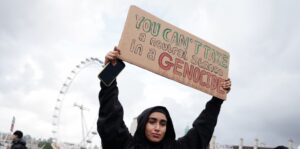Women and children bear the brunt of a brutal occupation that erases their humanity while subjecting them to relentless military aggression. In Gaza, the most densely populated strip on Earth, the siege tightens daily, depriving over two million people of the basic essentials of life.
In the West Bank, settler violence, condoned and facilitated by the Israeli state, has escalated to unprecedented levels. Palestinians are not only at the mercy of an occupying force but also trapped in a narrative that dehumanises them and normalises their suffering.
Historically, feminism has been a force for justice, taking on patriarchy, inequality, and colonial violence in its quest to liberate women. During the anti-apartheid movement in South Africa, women played a pivotal role in resisting both racial and gender oppression, demonstrating feminism’s potential to confront intersecting systems of injustice.
Feminists have long claimed the mantle of those who challenge power structures and stand with the most vulnerable. Yet, when it comes to Palestinian women — who endure unimaginable violence under occupation — this same movement, once defined by its commitment to solidarity and justice, has largely remained silent, or worse, complicit.
Instead of dismantling the rhetoric that sustains this oppression, many feminists have uncritically echoed it or turned their attention to distractions — abandoning the very women they claim to fight for.
Feminism, built on the promise of dismantling oppressive systems and challenging entrenched biases, has never looked more hollow than in its silence on Palestine.
How can this ethos hold any weight when Palestinian women, enduring one of the most violent examples of colonial oppression in modern history, are met with evasion by those who claim to fight for justice?
Let me spell it out for you, in case you’ve missed the news — or been in a collective coma: Gaza is a cage, sealed off and bombarded, where over two million people are denied basic human rights under the guise of “security.”
Here, Palestinian women endure the unthinkable: hunger, the absence of clean water, and dire shortages of necessities. Even menstruation becomes a humiliating ordeal, with women forced to use scraps of tents in place of sanitary pads. Pregnant women deliver babies without anaesthesia, risking anaemia, haemorrhage, and death.
Meanwhile, mothers bury the lifeless bodies of their children, digging through rubble to recover what remains. Instead of confronting the systems that sustain this violence, feminist spaces have spent the past year entangled in performative debates and superficial squabbles, letting the movement’s credibility disintegrate.

